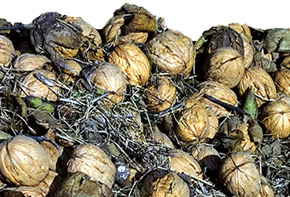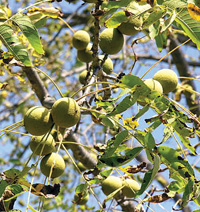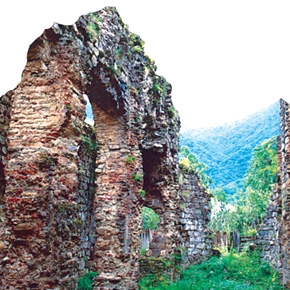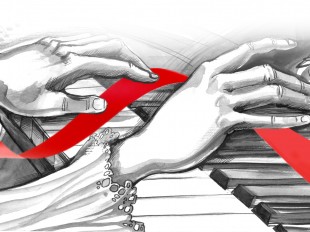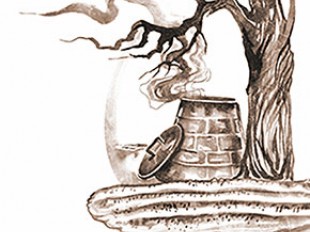 Pages 126-130
Pages 126-130by Sara Oghuz Nazirova
There was an odd fellow in our district. Everybody called him Mad Khanlar. Whenever people got together, they talked about him. They said that once, when Mad Khanlar was going to a party in another town, he attacked some horse thieves near the Daymadara River. They said he had distributed his father´s forest among his countrymen. He had spent his father´s wealth on foolish pleasures, eating and drinking every penny that he owned. Of course, his father´s wealth could not last forever.
One day there was great excitement. A rumour spread that his father´s wealth had not all been spent because Mad Khanlar was offering three gold pieces to anyone who planted a walnut tree on the side of the road.
The world had been turned upside down.
What if it was true?
A madman speaking the truth? What if he…
He has no cares. Anything could happen. They decided to go and ask him about it. Is it difficult to plant a tree? Three gold pieces are not small change. Mad Khanlar is mad and spends his father´s wealth on nothing. And what should we do? We can´t help thinking of that sweet money of his.
Old and young went to his house and asked him about the money he had promised to give for every tree planted on the verge of the new road.
Khanlar denied it, and only when they were about to leave did he say, “I will give three gold pieces, not to someone who plants a tree but for a planted tree.”
The people were dripping with sweat. They thought they could become wealthy if they planted a tree. Is it difficult to plant a tree? Dig and plant… And there will be more trees than the hairs on your head. What a man Mad Khanlar´s father was! Pharaoh´s wealth was a mouse´s nest in comparison with the riches of Khanlar´s father. So the son was a bad boy. Your wealth was in a wayward fellow´s hands. The water in a stream will dry up in such a son´s hands.
They went to the new road. You couldn´t find young walnut trees in the surrounding forests - the people had taken them all and planted them on the side of the road. When they came to the end of the road, no tree was left to plant there. Everybody marked their tree on the road in case Mad Khanlar wanted to check up on them. The people admired the trees they had planted on either side of the road and set off for Khanlar´s place, their shovels over their shoulders, to get their money.
“We´ve planted a row of trees along the new road. They stand up just like the teeth in a comb.” Khanlar smiled beneath his moustache: “Trees? Have trees grown on the roadside so soon?”
The people swore that they had planted trees. “You can count the leaves but you can´t count the trees on the sides of the road. If you don´t believe us, go and see for yourself.”
Khanlar smiled: “Those are just saplings. We call a tree a tree when it bears fruit.”
The people pounced on him like carrion-crows: “Are you trying to fool us? You yourself said that you would give three gold pieces for every tree.”
“Every planted tree doesn´t grow,” said Khanlar. “Come back when they are trees.”
The people were furious. First they wanted to beat him up, then they thought it would be better to keep their peace with such a wealthy man. They had planted trees and there was hope that they would get their gold eventually. So they went home upset.
They took care of the trees, watering them and digging around them to help them grow. In spring they pruned the tops of the trees to help them grow branches. Then they noticed that trees were planted so close together that they took each other´s light. They had wanted to plant as many trees as possible, but now they wouldn´t able to produce fruit as there was no room to grow. But it would be a pity to throw them away, so they advised one another to thin out the trees and plant a second row a little farther from the other trees. So there were two rows on either side of the road. As the saplings grew the walnut avenue became wider.
Everybody took care of their trees. When the weather became dry, they watered the trees and when there was a flood, they drained away the water. In short, they took care of every tree. But the cattle ate the young branches. People realized that if this continued, their labour would be for nothing. Only a few fruitless trees would be left. There was no remedy. The road was long and the trees were many. How could they take care of them all? After a discussion they went to Khanlar´s place for help. Let him give them part of the gold. Praying but doubting their chances of success, they visited Khanlar. What did they see? Khanlar had given his house to some orphans and now he lived in the cattle yard. He had built a hut out of cane in the middle of the yard and lived there.
The people hoped for the best: “Whoever gave his house to orphans would pay us, too.” Some old men came forward and said that the cattle had destroyed their trees. The trees had been nipped in the bud as the cattle were eating the trees. Give us part of our gold. You will give us the remainder when there is fruit. If there is no fruit we shall ask for nothing. Lying in his cane hut, Khanlar smiled: “Go and make baskets like the ones I made for myself.” The people were puzzled: “What does he mean?” Not wanting to offend him, they asked: “What baskets? What do they have to do with the gold?”
Khanlar said calmly: “Bottom-less baskets. There is plenty of cane in the bog and switch in the hazel wood.
Make baskets out of them and cover the trees. They will be safe.”
The people tried again to get some of the gold, but Khanlar interrupted them: “Come back when there´s fruit.”
The people went away, disheartened. Young and old, they all gathered cane and switch and wove them into baskets. They hung the yellow baskets over the trees. They created such an attractive scene that whoever passed the trees wanted to see them again. People came from far and wide to see the trees. It became a place for people to visit - the advice-road, the conversation-road, the hope-road. The walnut trees were growing and the people took care of them. They took so much care of the trees, that they nearly forgot Khanlar´s promise.
At last the people´s hard work began to bear fruit. All the walnut trees produced their nuts at the same time. The round fruit could hardly be seen among the leaves. They had been waiting for this. They visited Khanlar´s place. What did they see? Khanlar was now so old. The odd fellow´s wrists were like spindles, his wavy hair was soft, his huge moustache drooped.
“God Almighty, why has he become so weak and pale?”
The people looked at one another, as if they were seeing each other for the first time. They had become old, too. Some had passed away and not seen the fruits of their labours.
“What did you think?” Khanlar asked. “The walnut tree makes people old and weak.”
And only now did the people remember that the baskets around the trees were already rotten. And they didn´t remember who had planted which trees, whose trees they were. They had looked after the trees together. And they didn´t remember who should get more gold. When they explained this difficult task, Khanlar smiled brightly: “It doesn´t matter. Collect the fruit together. Let everybody take as much as they need.”
“You are very wise. That won´t be much of a headache,” the people agreed. “Now, give us our gold.”
Khanlar smiled again: “Go now. Come back only when you have harvested the fruits of your labours.”
The people got angry: “You´re fooling us again. You said when there will be fruit. The fruit is ready.”
Khanlar said calmly: “I promised to give you the gold only when you brought the fruit.”
The people wanted to beat this weak old man but they hesitated. They were afraid to force him to give them the gold. They thought they had been patient such a long time that they could wait for autumn to come. Wait a little and it will be here. It´s better to wait.
At last the walnut husks grew dark and cracked. The amber walnuts fell to the ground. They took a handful of walnuts and went to see Khanlar: “So here is the fruit.”
Khanlar cracked the walnut and said that the shell was thin; it was a good walnut. “It is a remedy for so many illnesses. Use its oil. The shell can be added to animal fodder once it´s been milled. You can colour cotton yarn with its leaves and make cloth. When the trees get old, turn them into boards and build houses with them. Walnut trees are a boon for the poor. Keep the wood as long as you wish, it won´t spoil. It is a pillar for any house. It is a peasant´s wealth.”
The people became impatient and interrupted him: “You approve of our walnuts, now give us our gold.”
“Is gold better than this? Shake the tree and collect the nuts.”
“That´s true. But you must pay for our labour with gold. You promised.”
“Have I got any gold?”
The people were angry: “We´ve been waiting for years. You promised gold for the fruit of a walnut tree. And here is the fruit.”
“I call these walnuts gold. The income from one tree is equal to three pieces of gold. Gather the walnuts and make use of them. The life span of a walnut tree is much longer than a man´s. Your grandchildren will also profit from them. Isn´t that better than gold?” Khanlar held up the walnuts to the light and smiled.
The people shouted: “You have been fooling us for so many years! Give us the gold or we´ll make you do it.”
“Look for it. If you find it, take it,” Khanlar said calmly.
“Have you been deceiving us? You´ve been making fools of us!” the people attacked Khanlar.
Khanlar interrupted them: “Why did I deceive you? Do you think that if someone like me had treasure he could stop spending it? Why would I live in a cane hut then? I meant that you would plant the walnut trees and have their fruit. This is what I advised you to do. Did I do you any harm?”
The people understood: “Why would Mad Khanlar live in a hut? Could he live this way and have treasure?”
A strong wind began to blow. Khanlar hurried them along: “The wind is getting up. Run to the road. The walnuts will be on the ground.”
When they heard this, the people forgot all about Khanlar. They took sacks and bags and rushed towards the road. They filled their sacks and bags with walnuts. Then they remembered the baskets. They filled the baskets with walnuts, too. There was no more room even in the sheds. The people said goodbye to the bad days. They did everything they planned. Somebody offered to take a basket of walnuts to Khanlar. When he had wealth he shared it with people. He did us a favour. He gave us good days. Everybody liked the idea. They took a basket and went to his place. What do you think they saw? Khanlar had passed away. The people sorrowfully took his body to the graveyard. They planted a walnut tree on his grave. They were always grateful to him. And they forgot the word “mad”. The walnut road was called Khanlar´s road. Years passed and the name became the Khan´s road. Nowadays people who travel this road admire the walnut trees. They want to know who created the fortress of walnuts on the road.
The translator of the story is V. Qambarov.
The Khans Road is one of many stories published in Selected Works by Sara Oghuz Nazirova.
